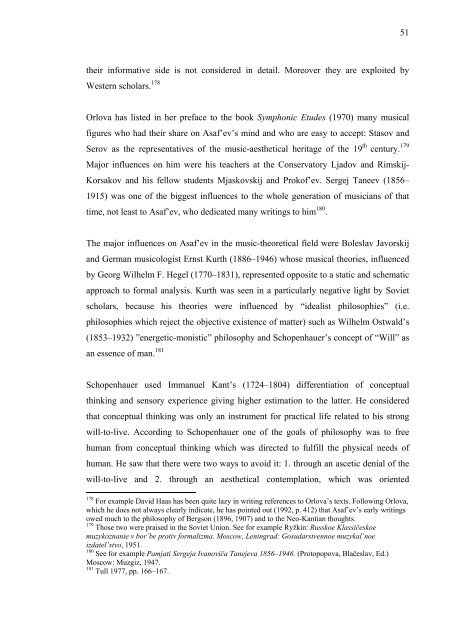Boris Asaf'ev and the Soviet Musicology - E-thesis
Boris Asaf'ev and the Soviet Musicology - E-thesis
Boris Asaf'ev and the Soviet Musicology - E-thesis
You also want an ePaper? Increase the reach of your titles
YUMPU automatically turns print PDFs into web optimized ePapers that Google loves.
<strong>the</strong>ir informative side is not considered in detail. Moreover <strong>the</strong>y are exploited by<br />
Western scholars. 178<br />
Orlova has listed in her preface to <strong>the</strong> book Symphonic Etudes (1970) many musical<br />
figures who had <strong>the</strong>ir share on Asaf’ev’s mind <strong>and</strong> who are easy to accept: Stasov <strong>and</strong><br />
Serov as <strong>the</strong> representatives of <strong>the</strong> music-aes<strong>the</strong>tical heritage of <strong>the</strong> 19 th century. 179<br />
Major influences on him were his teachers at <strong>the</strong> Conservatory Ljadov <strong>and</strong> Rimskij-<br />
Korsakov <strong>and</strong> his fellow students Mjaskovskij <strong>and</strong> Prokof’ev. Sergej Taneev (1856–<br />
1915) was one of <strong>the</strong> biggest influences to <strong>the</strong> whole generation of musicians of that<br />
time, not least to Asaf’ev, who dedicated many writings to him 180 .<br />
The major influences on Asaf’ev in <strong>the</strong> music-<strong>the</strong>oretical field were Boleslav Javorskij<br />
<strong>and</strong> German musicologist Ernst Kurth (1886–1946) whose musical <strong>the</strong>ories, influenced<br />
by Georg Wilhelm F. Hegel (1770–1831), represented opposite to a static <strong>and</strong> schematic<br />
approach to formal analysis. Kurth was seen in a particularly negative light by <strong>Soviet</strong><br />
scholars, because his <strong>the</strong>ories were influenced by “idealist philosophies” (i.e.<br />
philosophies which reject <strong>the</strong> objective existence of matter) such as Wilhelm Ostwald’s<br />
(1853–1932) ”energetic-monistic” philosophy <strong>and</strong> Schopenhauer’s concept of “Will” as<br />
an essence of man. 181<br />
Schopenhauer used Immanuel Kant’s (1724–1804) differentiation of conceptual<br />
thinking <strong>and</strong> sensory experience giving higher estimation to <strong>the</strong> latter. He considered<br />
that conceptual thinking was only an instrument for practical life related to his strong<br />
will-to-live. According to Schopenhauer one of <strong>the</strong> goals of philosophy was to free<br />
human from conceptual thinking which was directed to fulfill <strong>the</strong> physical needs of<br />
human. He saw that <strong>the</strong>re were two ways to avoid it: 1. through an ascetic denial of <strong>the</strong><br />
will-to-live <strong>and</strong> 2. through an aes<strong>the</strong>tical contemplation, which was oriented<br />
178<br />
For example David Haas has been quite lazy in writing references to Orlova’s texts. Following Orlova,<br />
which he does not always clearly indicate, he has pointed out (1992, p. 412) that Asaf’ev’s early writings<br />
owed much to <strong>the</strong> philosophy of Bergson (1896, 1907) <strong>and</strong> to <strong>the</strong> Neo-Kantian thoughts.<br />
179<br />
Those two were praised in <strong>the</strong> <strong>Soviet</strong> Union. See for example Ryžkin: Russkoe Klassičeskoe<br />
muzykoznanie v bor’be protiv formalizma. Moscow, Leningrad: Gosudarstvennoe muzykal’noe<br />
izdatel’stvo, 1951.<br />
180<br />
See for example Pamjati Sergeja Ivanoviča Tanejeva 1856–1946. (Protopopova, Blačeslav, Ed.)<br />
Moscow: Muzgiz, 1947.<br />
181<br />
Tull 1977, pp. 166–167.<br />
51

















